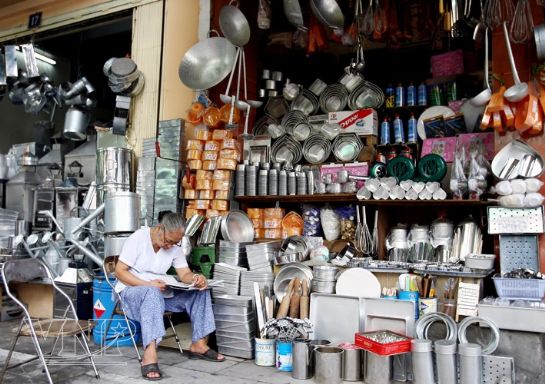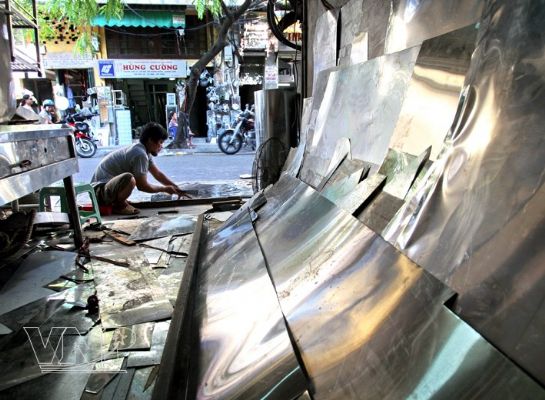|
Hang Thiec Street is a craft street of
tinsmiths which has existed for a long time in the Old Quarter. In
the past it was in Yen Noi Village, Tien Tuc Commune of Tho Xuong
District (present-day Hang Gai Ward of Hoan Kiem District, Hanoi).
Most of the houses in this street are old and have small garrets
which make the house look like “overlapping match boxes”.
Hang
Thiec Street is 136m long, stretching from Thuoc Bac Street to Hang
Non Street. It is the place where tinsmiths make different items,
such as oil lamps, candle stands, incense burners, tea pots, tea-set
trays and tips of conical hats. After a period of development the
craft also turned out other products from sheet metal, hence the
street was called Rue des Ferblanties by the French.
|

Various household utensils made of tin
are produced and sold along Hang Thiec Street.
|
|

A shop on Hang Thiec Street.
|
|

Local craftsmen make stainless steel
products by hand.
|
|

Cutting a corrugated iron sheet by
machine instead of by hand as previously done.
|
|

Hang Thiec Street is one of Hanoi’s
old craft streets that attracts many tourists.
| nbsp;
Over
the years Hang Thiec Street has virtually remained unchanged, with
the craft of making tin products still being kept, turning out
various kinds of utensils for daily use. On the occasion of
Mid-Autumn Festival the Street is busier because the craftsmen begin
to use pieces of tin to make children’s toys, such as cars, trains,
ships, planes, peach-shaped lanterns with a fairy inside,
butterfly-shaped lanterns and a rabbit beating a drum.
We
visited the family of Nguyen Phu Dinh, one of the families still
following the craft of their forefathers, on Hang Thiec Street. His
two sons have inherited their father’s skills and become artisans
with golden hands. Dinh said that payment for making tin products is
low, so people who open shops on Hang Thiec Street are only engaged
in trading. They receive orders for the products and have the orders
filled by the tinsmiths in the rural areas.
When
plastic utensils developed, Dinh and other craftsmen on Hang Thiec
Street were concerned that the craft could be lost. Through many ups
and downs now there are demands for tin products on the market. We
saw many pails, buckets, basins and sinks made of corrugated steel
piled in the shops and were told that these products would be
supplied to different cities and provinces throughout the
country.
In
the book “Old Streets of Hanoi”, American writer Lady Borton
described the sound on Hang Thiec Street: “…The roaring sounds of
hammers striking against the metal resound from early morning to
late at night. Vietnamese craftsmen have preserved their traditional
craft until today…”
Today coming to Hang Thiec Street, we clearly see that the
essential needs and useful household utensils have a good impact on
the preservation and development of the long-lasting traditional
craft. Although the number of people who follow their forefathers’
crafts have become fewer and fewer, they have helped maintain the
vitality of the craft streets in Hanoi and preserve its old cultural
features, creating the typical characteristics of the
thousand-year-old Thang Long.
Story: Tran Tri
Cong
Photos: Vu
Hieu
nbsp; |